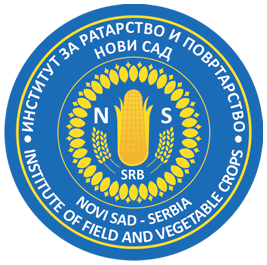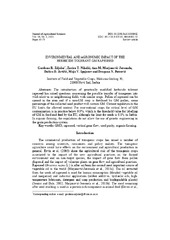Приказ основних података о документу
Environmental and agronomic impact of the herbicide tolerant GM rapeseed
GM uljana repica tolerantna na herbicide-uticaj na životnu sredinu i poljoprivredu
| dc.creator | Petrović, Gordana | |
| dc.creator | Nikolić, Zorica | |
| dc.creator | Marjanović-Jeromela, Ana | |
| dc.creator | Jovičić, Dušica | |
| dc.creator | Ignjatov, Maja | |
| dc.creator | Petrović, Dragana | |
| dc.date.accessioned | 2021-04-26T18:50:03Z | |
| dc.date.available | 2021-04-26T18:50:03Z | |
| dc.date.issued | 2011 | |
| dc.identifier.issn | 1450-8109 | |
| dc.identifier.uri | http://fiver.ifvcns.rs/handle/123456789/1001 | |
| dc.description.abstract | The introduction of genetically modified herbicide tolerant rapeseed has raised questions concerning the possible transfer of transgenes into wild relatives or neighbouring fields with similar crops. Pollen of rapeseed can be spread in the area and if a non-GM crop is fertilised by GM pollen, some percentage of the collected seed product will contain GM. Current regulation in the EU limits the allowed content. For conventional crops the critical level of GM contamination is in practice below 0.9%, which is the threshold value for labelling of GM in food and feed by the EU, although the limit for seeds is 0.1% in Serbia. In organic farming, the regulations do not allow the use of genetic engineering in the grain production system. | en |
| dc.description.abstract | Uvođenje genetski modifikovane uljane repice koja je otporna na herbicide nameće pitanja u vezi sa potencijalnim prenošenjem transgena sa genetski modifikovane uljane repice na njene divlje srodnike ili susedna polja sa sličnim kulturama. Polen uljane repice širi se u prostoru, te ukoliko je genetski nemodifikovan usev oplođen genetski modifikovanim polenom, određeni broj biljaka biće genetski modifikovan. Važeća zakonska regulativa u Evropskoj uniji ograničava dozvoljen sadržaj genetske modifikacije u usevima. Za konvencionalne useve najviši dozvoljen nivo kontaminacije u praksi je 0,9%, što je istovremeno i granična vrednost za obeležavanje GM hrane i hrane za životinje u Evropskoj uniji. U Srbiji kritična granica za semena iznosi 0,1%. U organskoj proizvodnji zakonska uredba ne dozvoljava upotrebu genetičkog inžinjeringa u sistemu proizvodnje semena. | sr |
| dc.publisher | Univerzitet u Beogradu - Poljoprivredni fakultet, Beograd | |
| dc.rights | openAccess | |
| dc.rights.uri | https://creativecommons.org/licenses/by-sa/4.0/ | |
| dc.source | Journal of Agricultural Sciences (Belgrade) | |
| dc.subject | GMO | en |
| dc.subject | rapeseed | en |
| dc.subject | vertical gene flow | en |
| dc.subject | seed purity | en |
| dc.subject | organic farming | en |
| dc.subject | GMO | sr |
| dc.subject | uljana repica | sr |
| dc.subject | vertikalni protok gena | sr |
| dc.subject | čistoća semena | sr |
| dc.subject | organska proizvodnja | sr |
| dc.title | Environmental and agronomic impact of the herbicide tolerant GM rapeseed | en |
| dc.title | GM uljana repica tolerantna na herbicide-uticaj na životnu sredinu i poljoprivredu | sr |
| dc.type | article | |
| dc.rights.license | BY-SA | |
| dc.citation.epage | 73 | |
| dc.citation.issue | 1 | |
| dc.citation.other | 56(1): 65-73 | |
| dc.citation.rank | M51 | |
| dc.citation.spage | 65 | |
| dc.citation.volume | 56 | |
| dc.identifier.doi | 10.2298/JAS1101065Z | |
| dc.identifier.fulltext | http://fiver.ifvcns.rs/bitstream/id/1857/998.pdf | |
| dc.type.version | publishedVersion |


